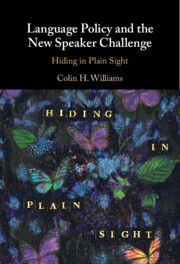Book contents
- Language Policy and the New Speaker Challenge
- Language Policy and the New Speaker Challenge
- Copyright page
- Contents
- Figures
- Tables
- Acknowledgements
- 1 The Emergence of the New Speaker Phenomenon
- 2 Popinjays, Pragmatism and Policy: A New Speaker Triptych
- 3 Wales: Normalised Expectations
- 4 Scotland: Cautious Consideration
- 5 Ireland: Tempered Acceptance
- 6 The Basque Autonomous Community and Navarre: Enthusiastic Endorsement
- 7 Catalonia and Galicia: Unalloyed Support?
- 8 The Policy Community and Recommendations on New Speakers
- 9 Conclusion: Contemporary Challenges
- Book part
- Bibliography
- Index
3 - Wales: Normalised Expectations
Published online by Cambridge University Press: 02 February 2023
- Language Policy and the New Speaker Challenge
- Language Policy and the New Speaker Challenge
- Copyright page
- Contents
- Figures
- Tables
- Acknowledgements
- 1 The Emergence of the New Speaker Phenomenon
- 2 Popinjays, Pragmatism and Policy: A New Speaker Triptych
- 3 Wales: Normalised Expectations
- 4 Scotland: Cautious Consideration
- 5 Ireland: Tempered Acceptance
- 6 The Basque Autonomous Community and Navarre: Enthusiastic Endorsement
- 7 Catalonia and Galicia: Unalloyed Support?
- 8 The Policy Community and Recommendations on New Speakers
- 9 Conclusion: Contemporary Challenges
- Book part
- Bibliography
- Index
Summary
Chapter 3 reports on the evidence-gathering undertaken in Wales. By interviewing selected politicians and a range of senior civil servants charged with the formulation and implementation of language policy, an evaluation is made of current thinking on the relevance of the new speaker phenomenon within official language policy. These enquiries are supplemented by interviews with civil society policy formulators, decision-makers from national organisations and academic specialists who have studied the phenomenon. Several innovative interventions are identified and evaluated at both national and local level. But the neat division between governmental and civil society policy formulators is misleading. Neither category is impervious to the ideas of the other for in so many minority language communities there is a close relationship between them. In the most promising contexts this interaction is mutually stimulating, if not necessarily co-dependent, as together they fight for the survival of their threatened languages.
Keywords
- Type
- Chapter
- Information
- Language Policy and the New Speaker ChallengeHiding in Plain Sight, pp. 53 - 109Publisher: Cambridge University PressPrint publication year: 2023

